Remington Premier Bismuth Waterfowl 20 Gauge 2.75" #5 0.87 oz – 25rds – R20509 For Sale
$46.69
The Remington Premier Bismuth Waterfowl 20 Gauge 2.75″ #5 0.87 oz is an excellent ammunition choice for hunters looking to enhance their hunting experience. Engineered with HEVI BISMUTH, this line offers a higher density than traditional steel, which extends the range and maintains the energy of shots, enabling them to travel further effectively. This increased density allows for the use of smaller shot sizes with more pellets per load, enhancing shot precision and the likelihood of successfully reaching hunting quotas. Suitable for various hunting environments, from open prairies to wooded areas, the Premier Bismuth excels in both upland and waterfowl hunting. It combines effectiveness and cost-efficiency, providing hunters with a reliable and potent tool for consistent hunting success.
Can you shoot bismuth at waterfowl?
Yes, you can shoot bismuth at waterfowl. Bismuth shot is a non-toxic alternative to lead shot and is approved for use in hunting waterfowl in many places. Always ensure compliance with local hunting regulations and guidelines to confirm its use is permitted in your area.
Why are bismuth cartridges so expensive?
Bismuth cartridges are generally more expensive due to several factors:
1. **Material Cost**: Bismuth is a relatively rare and expensive metal compared to lead, which has traditionally been used in ammunition. Its scarcity and the complexity involved in refining and processing add to its cost.
2. **Manufacturing Process**: Producing bismuth cartridges involves specialized processes to ensure the metal’s brittleness is managed and the pellets perform effectively. This often requires more advanced and costly manufacturing techniques.
3. **Performance and Demand**: Bismuth is a popular alternative to lead for hunting in environments where lead ammunition is banned due to its toxicity. It offers a similar density to lead, providing good ballistic performance without the environmental drawbacks. The demand for such eco-friendly alternatives can drive up prices.
4. **Niche Market**: Bismuth cartridges cater to a specific market niche, with lower production volumes compared to more common ammunition types, contributing to their higher cost.
These factors combined result in the higher expense associated with bismuth cartridges.
Is bismuth better than lead?
To determine whether bismuth is “better” than lead, we need to consider the context and criteria for comparison. Here are a few aspects where bismuth and lead differ:
1. **Toxicity:**
– **Bismuth:** Generally less toxic than lead, bismuth is often used as a non-toxic substitute in various applications, such as lead-free plumbing and ammunition.
– **Lead:** Known for its toxicity, which can lead to serious health problems, lead is restricted in many consumer products.
2. **Applications:**
– **Bismuth:** Used in pharmaceuticals, cosmetics, and as a replacement for lead in alloys and solders.
– **Lead:** Traditionally used in batteries, radiation shielding, and formerly in paints and gasoline.
3. **Density and Weight:**
– **Bismuth:** Has a lower density compared to lead, which is beneficial in some applications like shot and weights.
– **Lead:** Offers higher density, making it effective for weight-based applications like counterweights and protective shielding.
4. **Environmental Impact:**
– **Bismuth:** Considered more environmentally friendly due to its lower toxicity.
– **Lead:** Poses significant environmental challenges due to its persistence and toxicity.
Overall, whether bismuth is “better” than lead depends on the specific application and the priorities (such as toxicity, environmental impact, or material properties). In many modern applications, especially where safety and environmental concerns are paramount, bismuth is often favored over lead.
Is TSS better than bismuth?
Whether TSS (Tungsten Super Shot) is better than bismuth depends on the context, such as the intended use. Here’s a comparison in the context of shotgun ammunition:
1. **Density**:
– **TSS**: It is denser than bismuth, with a density of around 18 g/cc compared to bismuth’s 9.6 g/cc. This makes TSS more effective at retaining energy and penetrating targets.
2. **Performance**:
– **TSS**: The higher density means TSS pellets can be smaller while maintaining their effectiveness, which allows for more pellets in a shot, improving the shot pattern and increasing the likelihood of hitting the target.
– **Bismuth**: Being less dense compared to TSS, larger pellets are required to achieve the same energy and penetration, which means fewer pellets in the same volume.
3. **Cost**:
– **TSS**: Typically more expensive due to its higher density and manufacturing complexity.
– **Bismuth**: Generally more affordable, making it more accessible for regular use.
4. **Environmental Impact**:
– Both TSS and bismuth are better alternatives to lead, as they are less harmful to the environment. However, detailed environmental impacts depend on the specific context and regulations.
5. **Regulations**:
– Both materials are used to comply with regulations prohibiting the use of lead in certain areas due to environmental concerns.
In summary, for maximum performance and effectiveness, TSS is generally better than bismuth. However, if cost is a major factor, and extremely high performance isn’t required, bismuth is still a very good non-toxic alternative.
Can I shoot bismuth through a full choke?
Yes, you can shoot bismuth through a full choke. Bismuth is softer than steel and has ballistic properties similar to lead, making it safe for use in shotguns with full chokes. Nonetheless, always refer to your shotgun manufacturer’s guidelines for any specific restrictions or recommendations.
What is the only legal gun that can be used to take waterfowl?
The only legal gun that can be used to take waterfowl is a shotgun. Depending on local regulations, shotguns used for waterfowl hunting must typically be plugged to hold no more than three shells (including the one in the chamber) and must use non-toxic shot, such as steel, bismuth, or tungsten, to prevent environmental contamination.
Can you shoot bismuth in old shotguns?
It is generally safe to use bismuth shot in older shotguns, as it is softer than steel and more akin to lead, which older shotguns were typically designed to handle. However, it is important to ensure that the shotgun is in good condition and to use appropriate loads for the shotgun’s specifications. If in doubt, consult a gunsmith or the manufacturer for guidance specific to your shotgun’s make and model.
How much does a pound of bismuth cost?
As of the latest available data, the price of bismuth can fluctuate based on market conditions. Generally, the price may range from about $5 to $10 per pound. However, it is important to check a reliable and current commodity pricing source for the most up-to-date pricing, as these values can change due to factors like market demand, production changes, and economic conditions.
What size bismuth shot for geese?
For hunting geese, bismuth shot sizes between BB and T are generally recommended. BB or BBB are common choices as they provide a good balance of pellet count and knockdown power. Always check local regulations regarding shot size and type before hunting.
Can you mix lead and bismuth?
Yes, lead and bismuth can be mixed together. They are often combined to create certain types of alloys. Bismuth can be added to lead to improve its properties, such as reducing its toxicity and enhancing its machinability and environmental friendliness. Lead-bismuth alloys are used in various applications, including in the production of shotgun pellets and some types of solder. However, it’s important to consider the health and safety aspects when working with lead and ensure that proper precautions are taken.
What size shot of bismuth to lead?
In the context of shotgun pellets, bismuth pellets are often used as a non-toxic alternative to lead. Bismuth pellets are slightly less dense than lead, so they don’t retain energy quite as well. To compensate for this, it’s common to use a slightly larger bismuth pellet size compared to lead for similar performance.
For example, if you normally use lead shot size 6, you might consider using bismuth shot size 5 to achieve a comparable range and impact. However, specific recommendations can vary based on the specific application and the particular ammunition being used, so it’s always a good idea to consult the manufacturer’s guidelines or an expert for tailored advice.
What is a cheap alternative to lead shot?
A cheap alternative to lead shot is steel shot. Steel is less expensive and more environmentally friendly compared to lead. It is often used in hunting and shooting sports due to these benefits, as well as regulations that restrict or ban the use of lead shot in certain areas.
Can you shoot bismuth through Carlson choke tubes?
Yes, you can generally shoot bismuth through Carlson choke tubes. Bismuth is softer than steel, making it suitable for use with most modern choke tubes, including Carlson’s. However, always refer to the manufacturer’s guidelines specific to your choke tube model to ensure compatibility and avoid potential damage.
Is bismuth shot safe in old shotguns?
Using bismuth shot in old shotguns is generally considered a safer alternative to using steel shot. Bismuth is softer and more malleable than steel, which reduces the risk of damaging the barrels of older shotguns that were not designed to handle the hardness of steel shot. However, it is important to ensure that the bismuth shot is appropriate for your specific shotgun model and condition. It is always recommended to consult a knowledgeable gunsmith or the manufacturer’s guidelines to confirm compatibility and safety when using new types of ammunition, especially in older firearms.
What type of shot is illegal when hunting waterfowl in the US?
The use of lead shot is illegal when hunting waterfowl in the US. Hunters are required to use non-toxic alternatives, such as steel, bismuth, or tungsten shot, to prevent lead poisoning in wildlife and the environment.
Be the first to review “Remington Premier Bismuth Waterfowl 20 Gauge 2.75" #5 0.87 oz – 25rds – R20509” Cancel reply
Related products
Remington Premier Bismuth Waterfowl
Remington Premier Bismuth Waterfowl .410 Gauge 3" #4 0.56 oz – 25rds – R20514
Remington Premier Bismuth Waterfowl
Remington Premier Bismuth Waterfowl 12 Gauge 3" #2 1.37 oz – 25rds – R20500
Remington Premier Bismuth Waterfowl
Remington Premier Bismuth Waterfowl 12 Gauge 2.75" #5 1.25 oz – 25rds – R20505
Remington Premier Bismuth Waterfowl
Remington Premier Bismuth Waterfowl 20 Gauge 3" #5 1.25 oz – 25rds – R20508
Remington Premier Bismuth Waterfowl
Remington Premier Bismuth Waterfowl 16 Gauge 2.75" #4 1.12 oz – 25rds – R20511
Remington Premier Bismuth Waterfowl
Remington Premier Bismuth Waterfowl 28 Gauge 2.75" #4 0.87 oz – 25rds – R20513
Remington Premier Bismuth Waterfowl
Remington Premier Bismuth Waterfowl 12 Gauge 2.75" #2 1.25 oz – 25rds – R20503
Remington Premier Bismuth Waterfowl
Remington Premier Bismuth Waterfowl 12 Gauge 3" #5 1.37 oz – 25rds – R20501
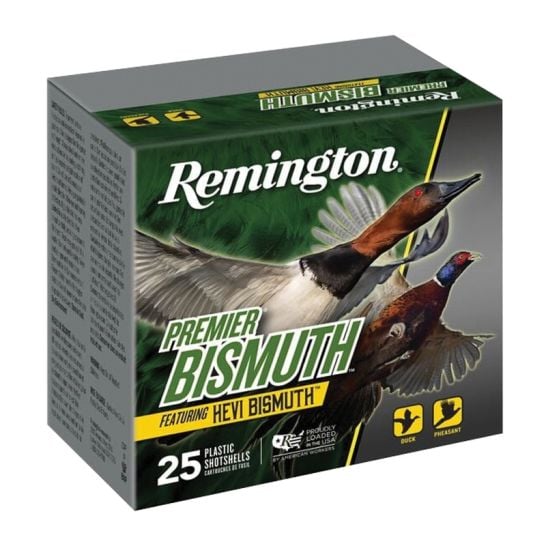
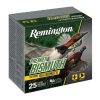
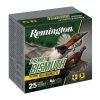
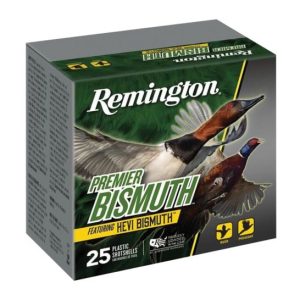
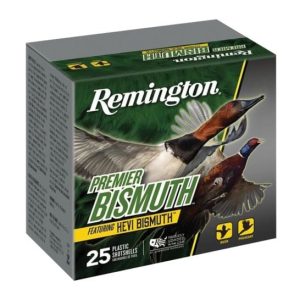
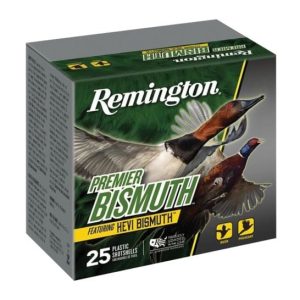
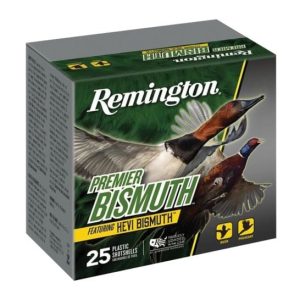
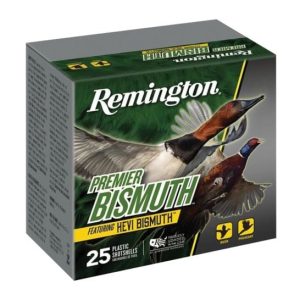
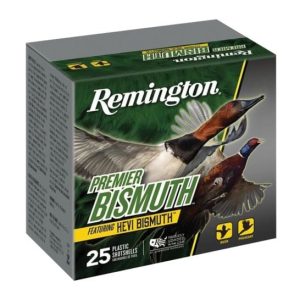
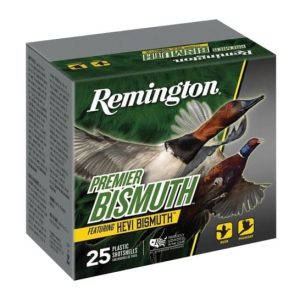
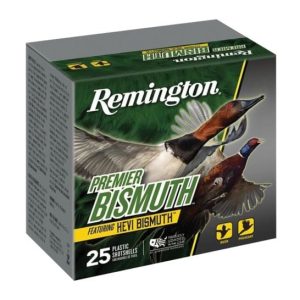
Reviews
There are no reviews yet.